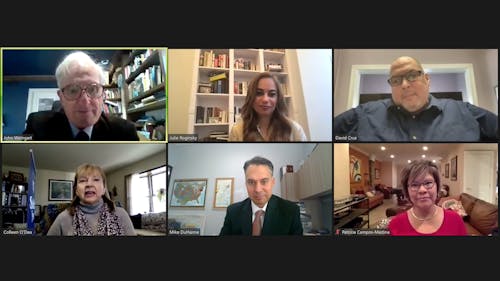Experts break down 2021 NJ gubernatorial election at Eagleton Institute of Politics event

The Rutgers Eagleton Institute of Politics held its annual post-election event “The Morning After” virtually yesterday morning featuring five panelists who shared their takes on the 2021 gubernatorial election.
John Weingart, the associate director of Eagleton, moderated the event and began by introducing the panelists, which included Colleen O’Dea, reporter and editor-at-large at NJ Spotlight News, David Cruz, senior correspondent at NJ Spotlight News, Michael DuHaime, a Republican campaign consultant, Julie Roginsky, a Democratic campaign consultant and Patricia Campos-Medina, a political strategist and president of Latina Civic.
The five panelists discussed a variety of topics regarding the election, including polling, campaign messaging, targeting, voting demographics and patterns, among various other topics.
O’Dea said she was surprised and could not have possibly predicted the way this election had turned out, stating that the polls predicted it inaccurately again, which she said has grown to be a consistent problem when it comes to elections.
“I'm not sure how we conduct polling in the future, but I think there needs to be some changes in terms of trying to figure this out,” she said. “Or maybe we just need to change our thoughts about how we cover these things because certainly the polls got it wrong.”
DuHaime said that polls early in races are misleading, especially for challengers who may not be well-known among their respective party yet. He said this was the case with Jack Ciattarelli since the beginning polls showed him way behind, though this was because the Republican party was not yet familiar with him.
He said polls have to factor in that by the end of a challenger’s campaign, the individuals will know who is running in their party and will likely vote that way. DuHaime also said that it is important to never take a challenger for granted in New Jersey, as there have been similar close races in the past, such as the 1997 gubernatorial election.
Roginsky said she believes that polls have become a poor indicator of how an election will turn out, stating that focus groups are more reliable and should be utilized more often.
“Polls have been discredited to me since at least the (former President Donald J.) Trump election because the reality is, the right people who need to poll just don't answer polls anymore,” she said.
Campos-Medina said another problem with polls is that they often do not talk to progressive, Black and Latinx voters, with certain barriers such as language also leading to issues in representation.
In addition, the panelists discussed the role that campaign messaging and targeting played in the election, with O’Dea and Roginsky stating that Gov. Phil Murphy (D-N.J.) had no campaign message and fell short in this regard.
O’Dea said she found it difficult to find something new that Murphy pledged to do in the next four years and that he failed to get across certain key issues, such as property taxes, throughout his campaign.
Roginsky said the Murphy campaign ignored affordability issues in New Jersey, something that is important among voters. She said his performance in this election can be blamed on poor messaging and targeting a specific cohort of individuals, forgetting about those in the middle who care about fiscal issues.
“I don't know what a ‘stronger and fairer’ New Jersey means if you don't actually put behind that what it means,” Roginsky said. “And the reality is that the Democrats … We consistently forget that what people care about in state elections are bread and butter fiscal issues, every single time we deviate from that as a grand message.”
Cruz said the emptiness and lackluster of Murphy’s election night event served as a microcosm for the campaign as a whole.
In terms of Ciattarelli’s campaign messaging, DuHaime said he did a good job at getting out certain economic messages, such state issues, property taxes and unemployment, that historically have brought individuals together despite political parties. In addition, he said Ciattarelli’s focus on making the state more business and job-friendly was important to his campaign.
“Ciattarelli is talking about much more back to basics, which from a campaign messaging point of view, and clearly to many unaffiliated voters in the state from a governing point of view, that's what they want,” DuHaime said.
Roginsky said she was shocked that Murphy never pivoted from his 2017 election messaging that focused on targeting Democratic primary voters. She said that even with just focusing on this group, it was still difficult to motivate them and give them a reason to vote.
Campos-Medina said that by Murphy focusing his campaign strategy on Democrats and suburban voters, he ignored urban voters and failed to support infrastructure for and investments in Black and Latinx voters.
“A lack of investment in building infrastructure to support a liberal governor message, I think, really hurt him,” she said. “And now we can create excitement with the more progressive part of the electorate in New Jersey which is young, it is Black and Brown, it is immigrant. That vote is not a traditional vote that Democrats in the traditional Democratic Party want to spend time convincing and talking to and understanding.”
O’Dea said the way in which New Jersey conducts these elections and reports the results makes it difficult to get a complete picture, especially having to factor in mail-in and early voting ballots into the equation.
Cruz said there have already been sentiments from individuals in the Republican party expressing the notion that every legal vote must count.
“My fear or concern is that we're gonna see two weeks of this haggling over votes and … that never serves the state,” Cruz said. “I think that if that is what happens over the next two weeks, that's not going to be good for Jersey.”



